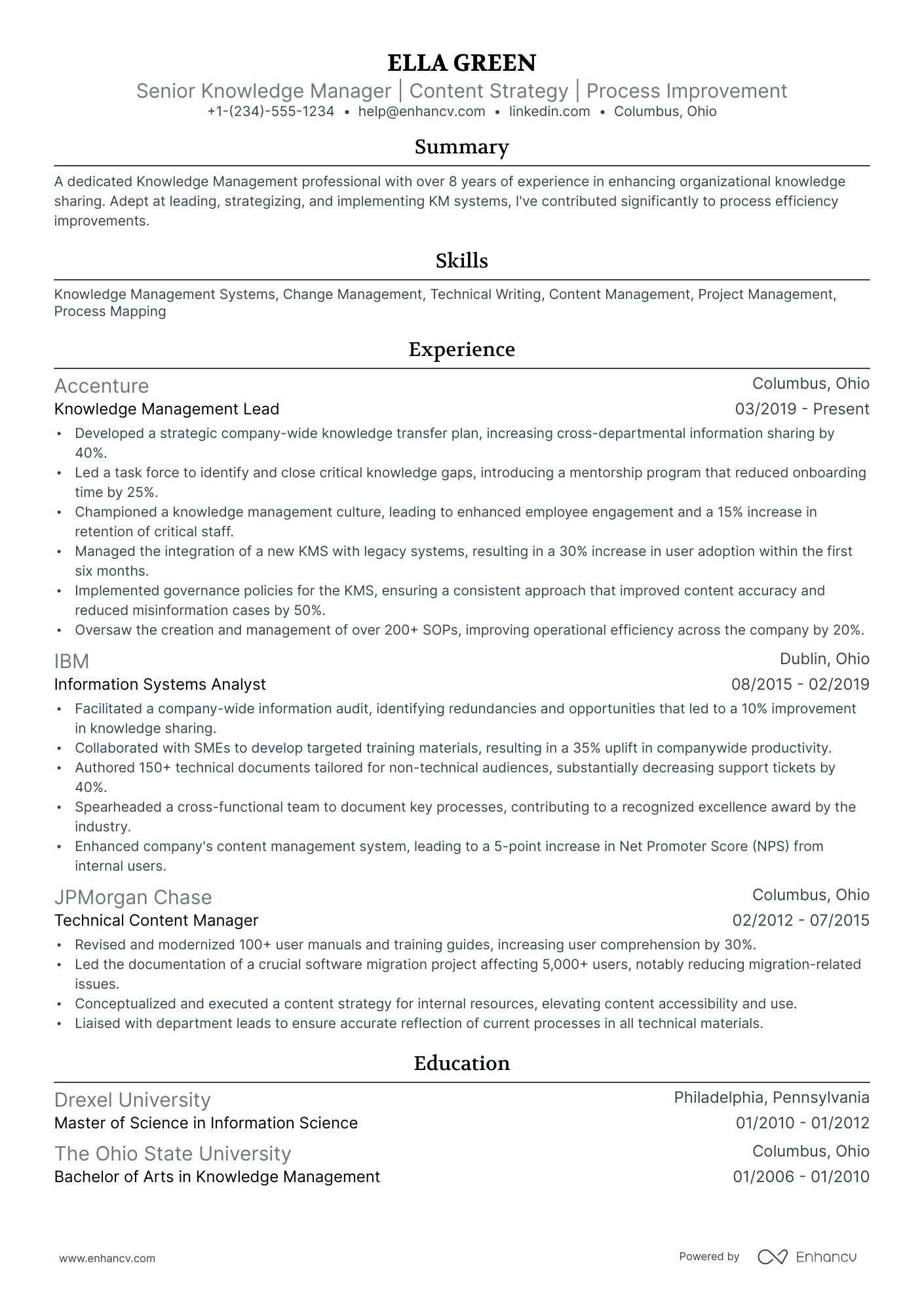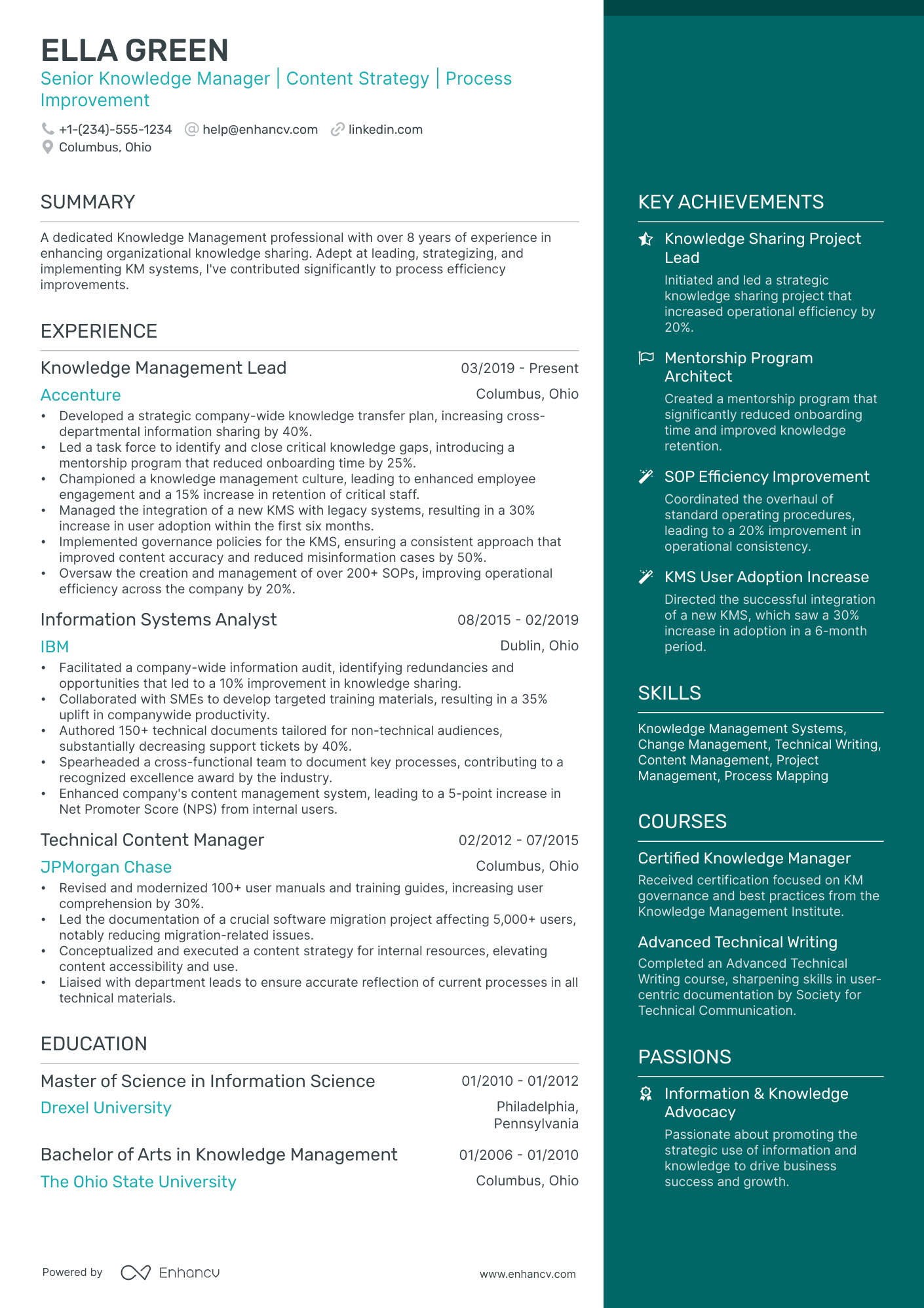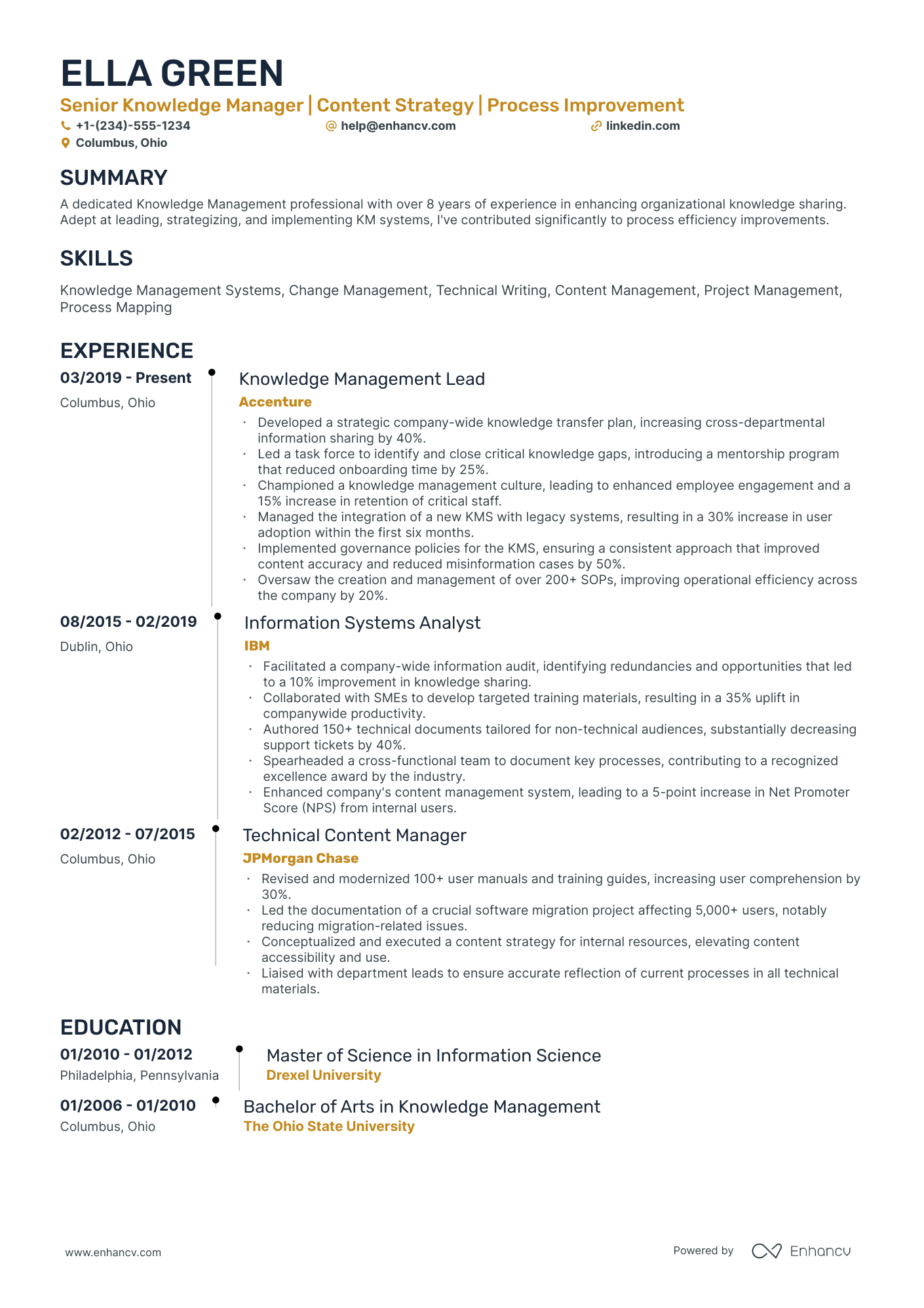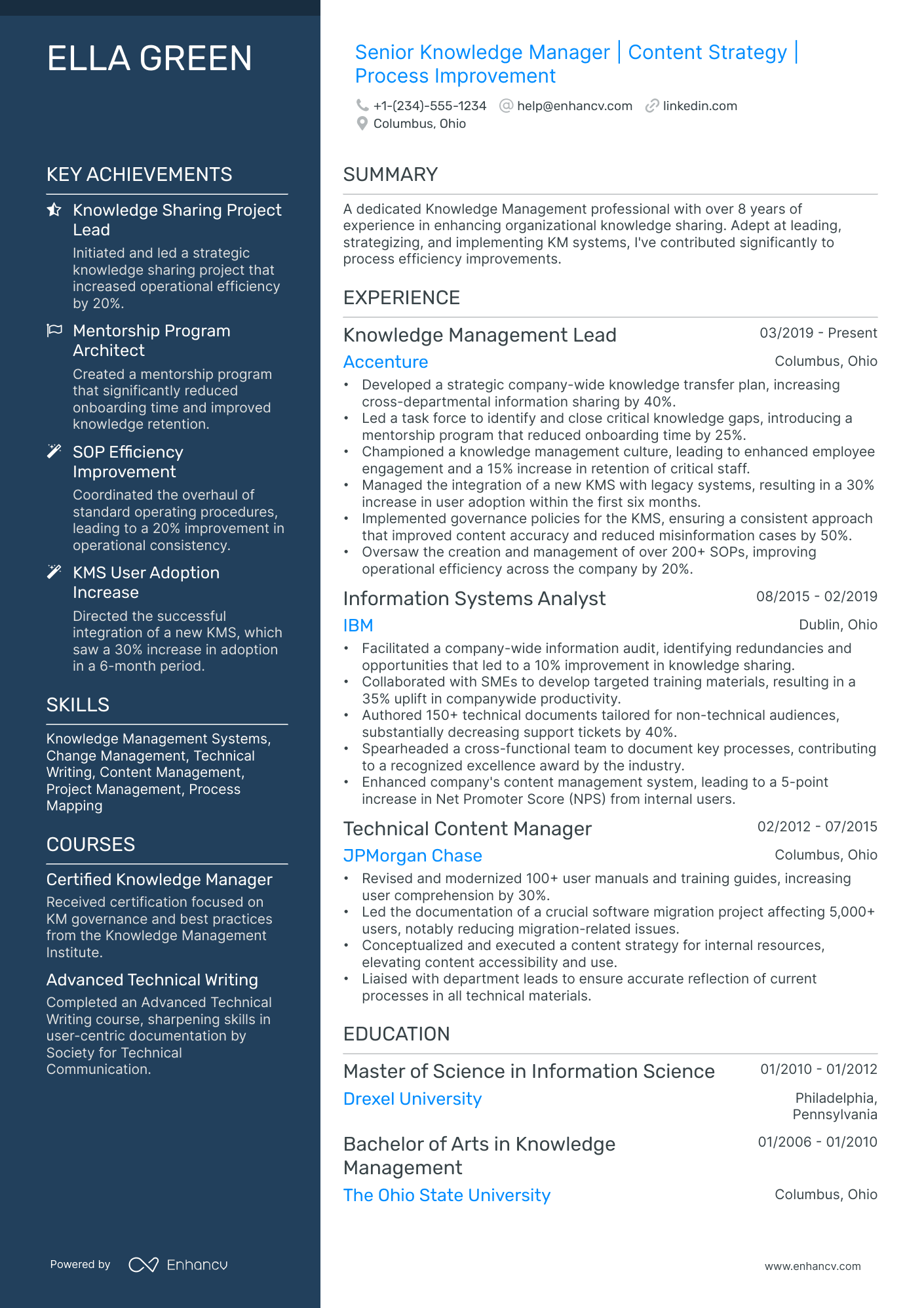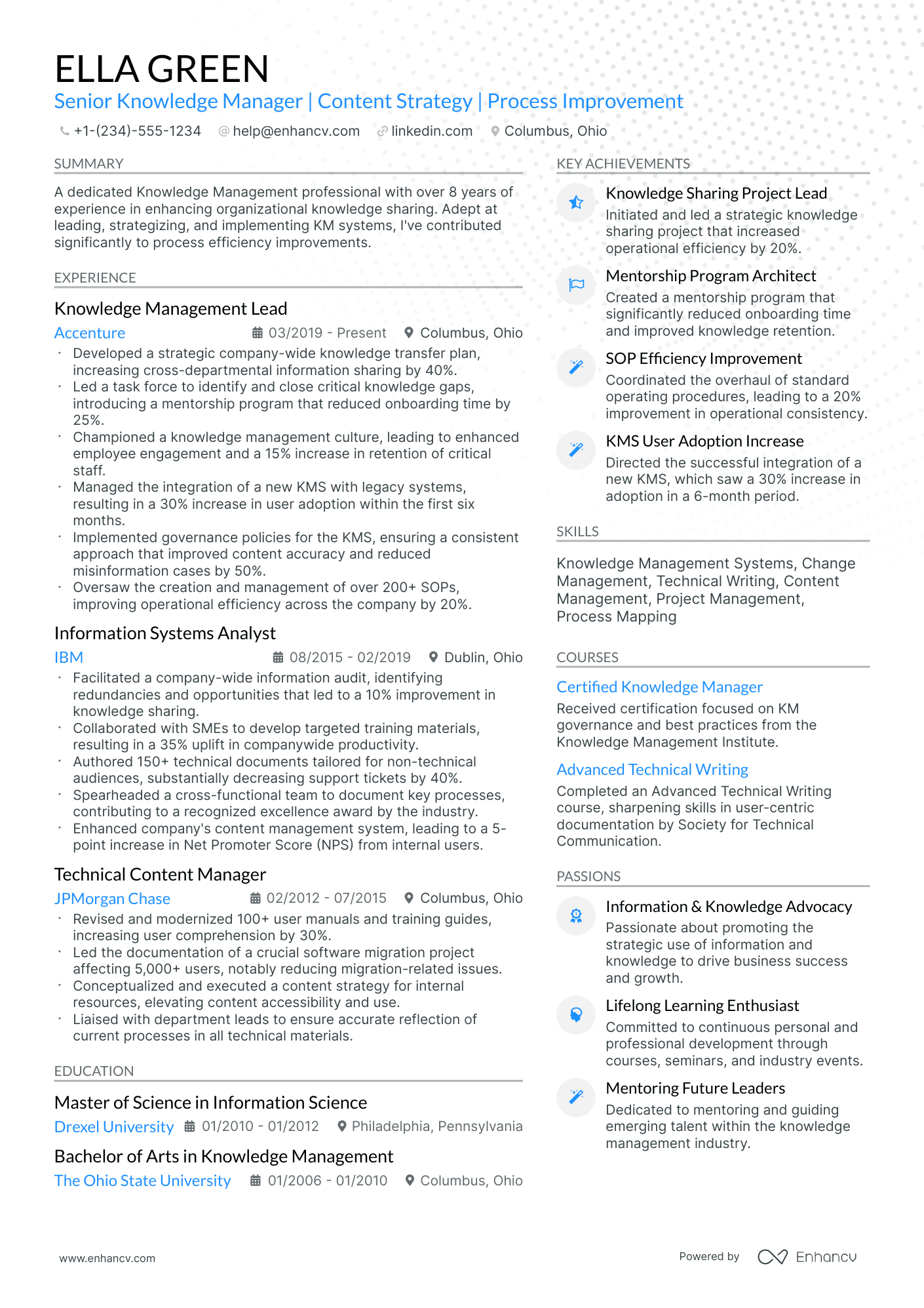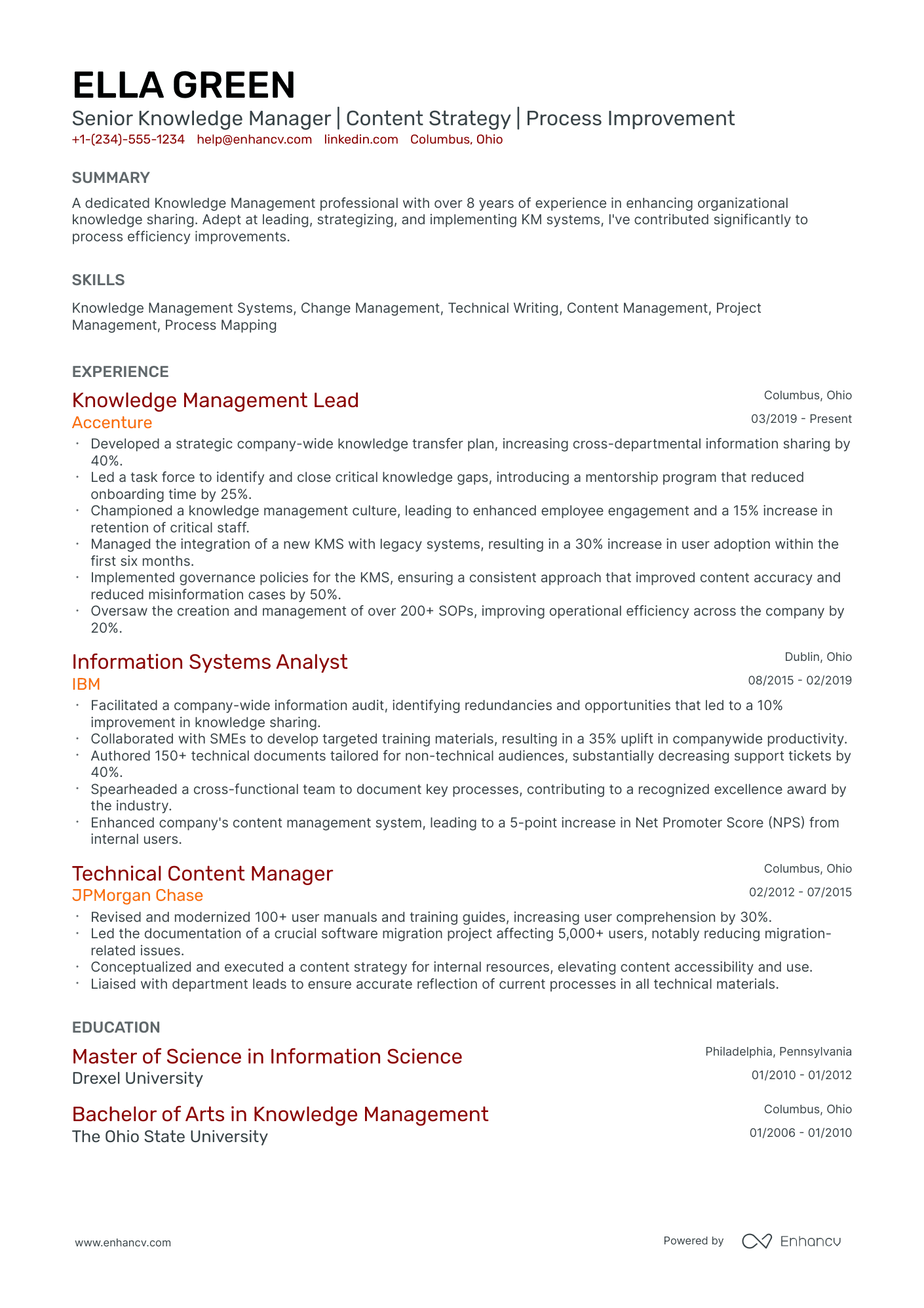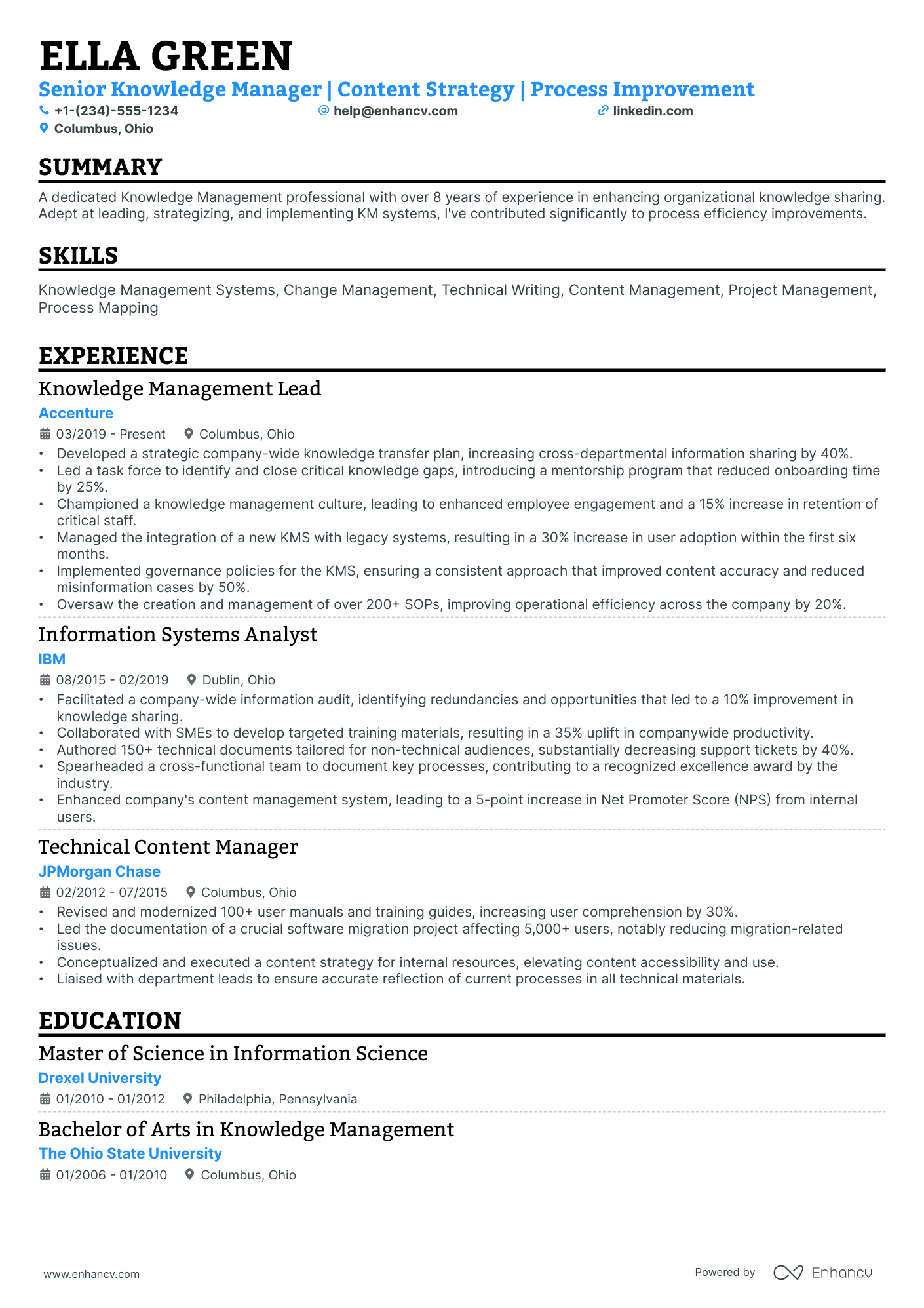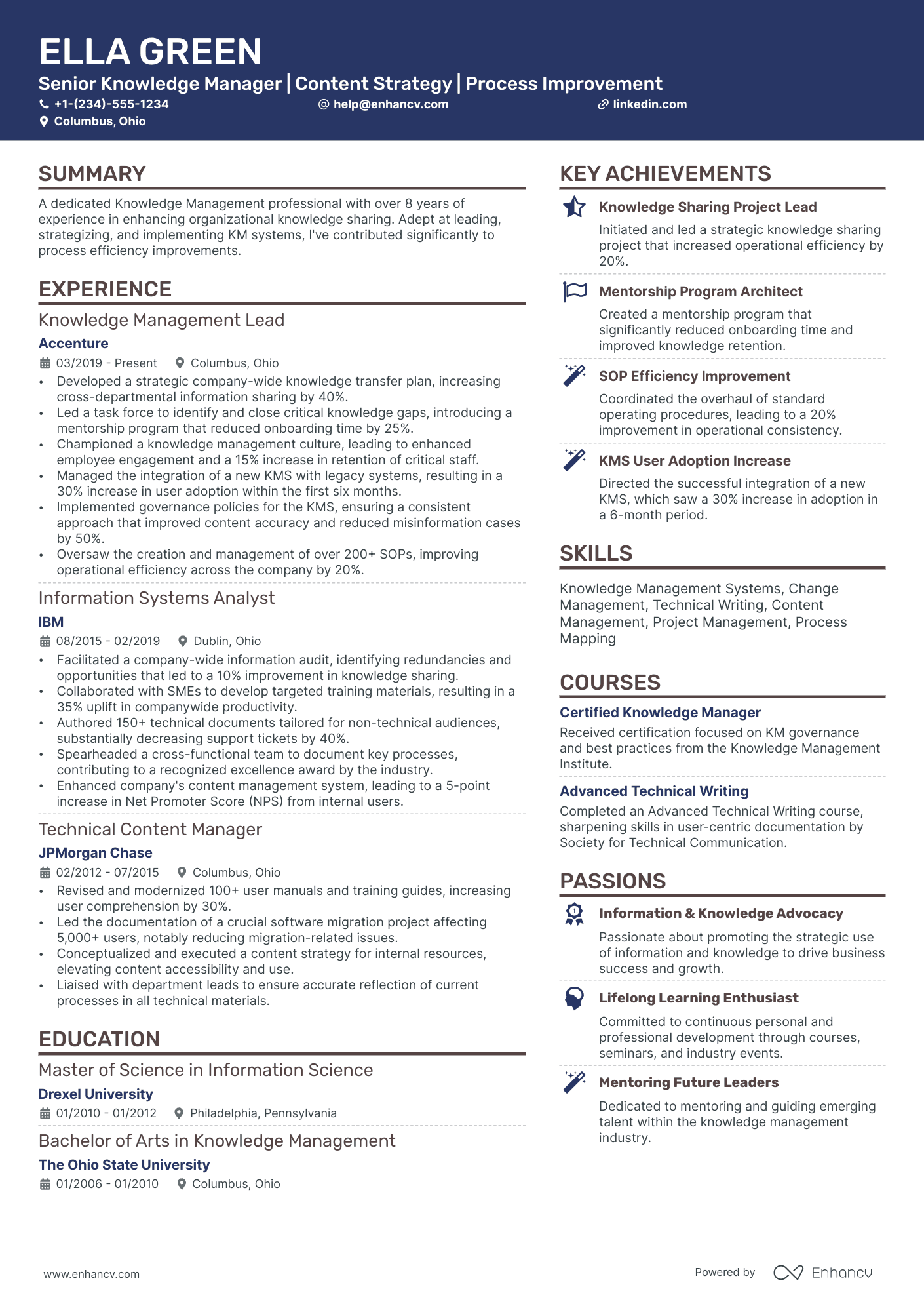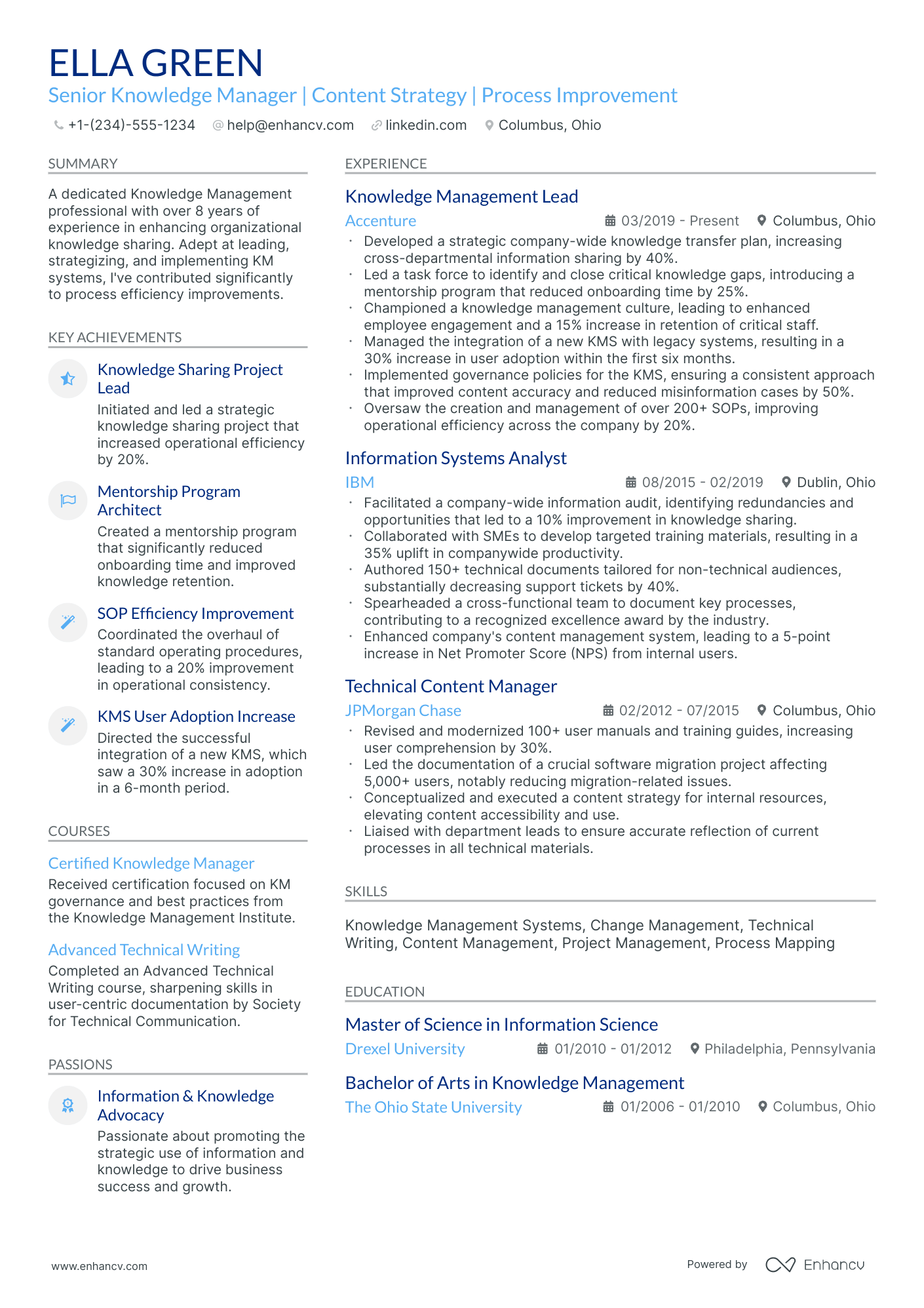Many knowledge manager resume drafts fail because they describe repositories and tools but don't show how knowledge changed decisions, speed, or quality. That gap hurts during ATS filtering and quick recruiter scans, where proof and relevance decide who advances. Understanding how to make your resume stand out starts with shifting from task lists to evidence of impact.
A strong resume shows outcomes and scale, not task lists. You should highlight faster time to resolution, higher self-service adoption, reduced duplicate work, improved search success, shorter onboarding time, better compliance, and measurable savings across teams.
Key takeaways
- Quantify knowledge management outcomes like search success, deflection rates, and time savings on every resume.
- Use reverse-chronological format for experienced candidates and hybrid format for career switchers.
- Mirror the exact tools, platforms, and terminology from each job posting in your experience bullets.
- Lead every bullet with an action verb, a specific task, and a measurable result.
- Place skills above experience if you're junior, below experience if you're mid-level or senior.
- Pair certifications like KCS v6 or CKM with education to validate specialized expertise fast.
- Use Enhancv to turn everyday knowledge management tasks into recruiter-ready, quantified resume bullets.
Job market snapshot for knowledge managers
We analyzed 183 recent knowledge manager job ads across major US job boards. These numbers help you understand top companies hiring, experience requirements, industry demand at a glance.
What level of experience employers are looking for knowledge managers
| Years of Experience | Percentage found in job ads |
|---|---|
| 1–2 years | 1.6% (3) |
| 3–4 years | 10.4% (19) |
| 5–6 years | 11.5% (21) |
| 7–8 years | 4.4% (8) |
| 9–10 years | 1.6% (3) |
| 10+ years | 7.7% (14) |
| Not specified | 64.5% (118) |
Knowledge manager ads by area of specialization (industry)
| Industry (Area) | Percentage found in job ads |
|---|---|
| Finance & Banking | 69.4% (127) |
| Healthcare | 10.4% (19) |
| Education | 9.3% (17) |
| Manufacturing | 6.6% (12) |
Top companies hiring knowledge managers
| Company | Percentage found in job ads |
|---|---|
| McDermott Will & Emery | 30.6% (56) |
| DLA Piper | 12.0% (22) |
Role overview stats
These tables show the most common responsibilities and employment types for knowledge manager roles. Use them to align your resume with what employers expect and to understand how the role is structured across the market.
Day-to-day activities and top responsibilities for a knowledge manager
| Responsibility | Percentage found in job ads |
|---|---|
| Knowledge management | 26.2% (48) |
| Microsoft office suite | 24.0% (44) |
| Excel | 20.8% (38) |
| Powerpoint | 19.1% (35) |
| Sharepoint | 19.1% (35) |
| Outlook | 18.0% (33) |
| Word | 18.0% (33) |
| Ai | 17.5% (32) |
| Project management | 16.9% (31) |
| Artificial intelligence | 14.8% (27) |
| Data analytics | 13.1% (24) |
| Power bi | 13.1% (24) |
Type of employment (remote vs on-site vs hybrid)
| Employment type | Percentage found in job ads |
|---|---|
| On-site | 63.9% (117) |
| Hybrid | 27.3% (50) |
| Remote | 8.7% (16) |
How to format a knowledge manager resume
Recruiters evaluating knowledge manager resumes look for evidence of structured information governance, cross-functional collaboration, and measurable improvements in knowledge accessibility and organizational efficiency. A clean, well-organized resume format ensures these signals surface quickly during both automated screening and manual review.
I have significant experience in this role—which format should I use?
Use a reverse-chronological format to present your knowledge management career in a clear, progression-driven narrative. Do:
- Lead with your most recent role and emphasize scope of ownership—number of teams supported, size of knowledge bases managed, and governance frameworks you designed or maintained.
- Highlight role-specific tools and domains such as Confluence, SharePoint, taxonomy development, content lifecycle management, and enterprise search optimization.
- Quantify outcomes tied to business impact, including reductions in knowledge retrieval time, improvements in onboarding efficiency, or decreases in duplicate content across repositories.
I'm junior or switching into this role—what format works best?
A hybrid format works best, letting you lead with a focused skills section while still showing relevant work history in chronological order. Do:
- Place a skills summary at the top that highlights core competencies like information architecture, content curation, metadata tagging, and knowledge base administration.
- Include academic projects, freelance work, or transitional experience—such as building internal wikis, managing FAQ systems, or organizing shared drives—that demonstrates practical knowledge management capability.
- Connect every action to a clear outcome so hiring managers can see the value you delivered, even without a long tenure in the field.
Why not use a functional resume?
A functional format strips away the timeline and context that hiring managers need to evaluate how you applied knowledge management practices in real organizational settings, making it harder to assess your readiness for the role.
- A functional resume may be acceptable if you're transitioning from a related field like library science, technical writing, or information architecture and lack direct knowledge management job titles—but only if you tie every listed skill to a specific project, deliverable, or measurable outcome.
Now that your resume's structure and layout are set, it's time to fill each part with the right content—starting with knowing exactly which sections to include.
What sections should go on a knowledge manager resume
Recruiters expect to see how you capture, organize, govern, and scale knowledge so teams can find answers fast and work consistently. Knowing what to put on a resume for this role means prioritizing impact over generic duties.
Use this structure for maximum clarity:
- Header
- Summary
- Experience
- Skills
- Projects
- Education
- Certifications
- Optional sections: Publications, Awards, Languages
Strong experience bullets should emphasize measurable impact, adoption, and outcomes—such as faster time-to-answer, higher self-serve resolution, improved search performance, reduced rework, and clearer governance across teams.
Is your resume good enough?
Drop your resume here or choose a file. PDF & DOCX only. Max 2MB file size.
Once you’ve organized your resume with the right components, the next step is to write your knowledge manager resume experience section so each role reinforces that structure with clear, relevant impact.
How to write your knowledge manager resume experience
The experience section is where you prove you've built, maintained, and improved knowledge systems that people actually use. Hiring managers prioritize demonstrated impact—taxonomies you designed, repositories you migrated, adoption rates you lifted—over generic descriptions of daily responsibilities. Building a targeted resume ensures each bullet speaks directly to the role's priorities.
Each entry should include:
- Job title
- Company and location (or remote)
- Dates of employment (month and year)
Three to five concise bullet points showing what you owned, how you executed, and what outcomes you delivered:
- Ownership scope: the knowledge bases, content repositories, taxonomy structures, internal wikis, or documentation programs you were directly accountable for managing and evolving.
- Execution approach: the knowledge management platforms, content governance frameworks, information architecture methods, or AI-assisted search tools you used to organize, curate, and distribute organizational knowledge.
- Value improved: the changes you drove in knowledge accessibility, search accuracy, content freshness, self-service resolution rates, onboarding speed, or reduction in duplicated or outdated information.
- Collaboration context: how you partnered with subject matter experts, product teams, IT, customer support, or leadership to capture tacit knowledge, align documentation standards, and embed knowledge-sharing practices across the organization.
- Impact delivered: the outcomes your work produced—expressed through adoption growth, time savings, reduced support escalations, improved compliance, or faster employee ramp-up—rather than a list of tasks you performed.
Experience bullet formula
A knowledge manager experience example
✅ Right example - modern, quantified, specific.
Knowledge Manager
NorthBridge Health | Austin, TX (Hybrid)
2021–Present
Scaled an enterprise health technology platform supporting 4,000+ internal users across customer support, implementation, and product teams.
- Led a taxonomy and information architecture redesign in Confluence and Jira Service Management, cutting article search time by 38% and increasing self-serve resolution by 22% across support and implementation teams.
- Implemented a knowledge-centered service methodology and governance workflow with subject matter experts and team leads, raising content freshness from 54% to 91% and reducing repeat tickets by 17%.
- Built a content quality program using style guides, templates, and peer review in Google Workspace and Confluence, improving article helpfulness ratings from 3.8 to 4.5 out of five and lowering escalations by 12%.
- Launched a Zendesk Guide and Salesforce Service Cloud knowledge integration with single-source publishing, reducing duplicate content by 28% and saving 160+ hours per quarter for support and product operations.
- Partnered with product managers, designers, and engineers to operationalize release documentation and change communications, cutting time-to-publish from five days to two days and reducing post-release defects tied to misconfiguration by 14%.
Now that you've seen how a strong experience section comes together, let's look at how to adapt yours to match a specific job posting.
How to tailor your knowledge manager resume experience
Recruiters evaluate your knowledge manager resume through both applicant tracking systems and human review, so tailoring your resume to the job description is essential. Tailoring ensures the specific tools, methodologies, and competencies the employer prioritizes appear clearly in your work history.
Ways to tailor your knowledge manager experience:
- Mirror the knowledge management platforms and tools listed in the posting.
- Match the taxonomy or classification terminology the employer uses.
- Reflect specific content governance standards or frameworks they reference.
- Highlight experience in the industry or domain the role requires.
- Emphasize information security or compliance protocols when the posting mentions them.
- Use the same language for collaboration workflows or cross-functional models described.
- Align your KPIs with the success metrics outlined in the job description.
- Feature change management or adoption strategies if the role prioritizes them.
The goal is to present your real accomplishments using language that directly reflects what the employer is asking for, not to force keywords where they don't belong.
Resume tailoring examples for knowledge manager
| Job description excerpt | Untailored | Tailored |
|---|---|---|
| "Develop and maintain enterprise knowledge bases using Confluence and SharePoint, ensuring content accuracy and accessibility across global teams." | Managed knowledge base content and kept information up to date. | Built and maintained 12 enterprise knowledge bases in Confluence and SharePoint, serving 3,500+ employees across eight global offices with a 97% content accuracy rate during quarterly audits. |
| "Design and implement taxonomy and metadata frameworks to improve search relevance and knowledge discoverability within ServiceNow." | Helped organize information so employees could find what they needed. | Designed a taxonomy and metadata tagging framework within ServiceNow that improved internal search relevance by 40%, reducing average knowledge article retrieval time from 4.2 minutes to 1.5 minutes. |
| "Lead knowledge management governance, including content lifecycle policies, stakeholder training, and KM adoption metrics tracking using KPIs such as article reuse rate and time-to-resolution." | Worked with stakeholders to promote knowledge sharing and best practices. | Led KM governance for a 200-person support organization, enforcing content lifecycle policies that increased article reuse rate by 35% and cut average time-to-resolution by 22% over two quarters through structured stakeholder training and monthly KPI reporting. |
Once you’ve aligned your experience with the role’s priorities, quantify your achievements to show the impact of that work with clear, measurable results.
How to quantify your knowledge manager achievements
Quantifying your achievements proves your knowledge base drives faster answers, better decisions, and lower risk. Track search success, time to publish, deflection, accuracy, adoption, and compliance outcomes across key teams and tools.
Quantifying examples for knowledge manager
| Metric | Example |
|---|---|
| Search success rate | "Raised search success from 62% to 81% by redesigning taxonomy and synonyms in Confluence and Elasticsearch, reducing 'no results' queries by 38%." |
| Publish cycle time | "Cut article publish turnaround from eight days to three by adding SME templates, a review queue in Jira, and weekly editorial triage." |
| Case deflection | "Increased self-serve deflection by 19% by launching troubleshooting guides in Zendesk Guide, reducing monthly ticket volume by 420." |
| Content accuracy | "Reduced outdated or incorrect articles from 14% to 5% through quarterly audits, version control, and a two-step SME approval workflow." |
| Compliance risk | "Achieved 100% completion of annual policy updates across fifty-two documents and passed two audits with zero findings by standardizing governance and retention rules." |
Turn your everyday tasks into measurable, recruiter-ready resume bullets in seconds with Enhancv's Bullet Point Generator.
Once you've crafted strong bullet points for your experience section, it's equally important to highlight the right hard and soft skills that reinforce your qualifications as a knowledge manager.
How to list your hard and soft skills on a knowledge manager resume
Your skills section shows how you capture, govern, and scale organizational knowledge, and recruiters and an ATS (applicant tracking system) scan this section for role-fit keywords—aim for a balanced mix of hard skills and job-specific soft skills.
knowledge manager roles require a blend of:
- Product strategy and discovery skills.
- Data, analytics, and experimentation skills.
- Delivery, execution, and go-to-market discipline.
- Soft skills.
Your skills section should be:
- Scannable (bullet-style grouping).
- Relevant to the job post.
- Backed by proof in experience bullets.
- Updated with current tools.
Place your skills section:
- Above experience if you're junior or switching careers.
- Below experience if you're mid/senior with strong achievements.
Hard skills
- Knowledge base architecture
- Information taxonomy and ontology
- Metadata standards and tagging
- Content lifecycle management
- Knowledge governance and policies
- Confluence, SharePoint, Notion
- ServiceNow Knowledge Management
- Zendesk Guide, Salesforce Service Cloud
- Search optimization and relevance tuning
- Google Analytics, Looker
- SQL reporting and dashboards
- SOP and playbook development
Soft skills
- Stakeholder alignment and buy-in
- Cross-functional facilitation
- Clear technical writing
- Interviewing subject matter experts
- Translating needs into workflows
- Prioritization and backlog management
- Decision-making with constraints
- Ownership of quality standards
- Change management communication
- Conflict resolution in reviews
- Attention to compliance details
- Continuous improvement mindset
How to show your knowledge manager skills in context
Skills shouldn't live only in a bulleted list on your resume. Explore examples of resume skills shown in context to see how top candidates weave competencies into real achievements.
They should be demonstrated in:
- Your summary (high-level professional identity)
- Your experience (proof through outcomes)
Here's what that looks like in practice.
Summary example
Senior knowledge manager with 10 years in healthcare IT, skilled in Confluence administration, taxonomy design, and cross-functional training. Built an enterprise knowledge base that cut employee onboarding time by 35% and reduced redundant support tickets.
- Signals senior-level expertise immediately
- Names specific platforms and methods
- Leads with a measurable outcome
- Highlights collaboration and leadership
Experience example
Senior Knowledge Manager
Vantage Health Systems | Remote
March 2019–Present
- Redesigned the internal knowledge base in Confluence, reducing average ticket resolution time by 28% across three support teams.
- Partnered with product and engineering leads to build a structured taxonomy, improving content discoverability scores by 40%.
- Launched a company-wide knowledge-sharing program using SharePoint and Slack integrations, increasing active contributor participation by 55%.
- Every bullet includes measurable proof.
- Skills surface naturally through real outcomes.
Once you’ve demonstrated how your knowledge management strengths show up in real work outcomes, the next step is translating those strengths into a resume when you don’t have direct experience.
How do I write a knowledge manager resume with no experience
Even without full-time experience, you can demonstrate readiness through transferable projects and hands-on work. Our guide on writing a resume without work experience covers strategies that apply directly to knowledge manager candidates:
- Knowledge base build for student org.
- Customer support ticket tagging audits.
- Internal wiki cleanup and governance.
- Documentation for process standardization.
- SharePoint site migration assistance.
- Confluence space setup and templates.
- Taxonomy and metadata mapping project.
- Search analytics report and improvements.
Focus on:
- Knowledge manager tools used.
- Governance, taxonomy, and metadata.
- Measurable documentation and search gains.
- Cross-team knowledge workflow examples.
Resume format tip for entry-level knowledge manager
Use a combination resume format to lead with skills and projects, then list experience. It highlights knowledge manager work samples when your job history is limited. Do:
- Add a Projects section above Experience.
- List tools: Confluence, SharePoint, Zendesk.
- Show metrics: views, deflection, time saved.
- Describe governance: taxonomy, owners, review cycles.
- Link to a sanitized writing sample.
- Built a Confluence knowledge base for a student org, created taxonomy and templates, and cut repeat questions by 30% over eight weeks using search analytics.
Even without direct experience, your education section can demonstrate the foundational knowledge and relevant coursework that qualify you for a knowledge manager role.
How to list your education on a knowledge manager resume
Your education section helps hiring teams confirm you have the foundational knowledge to manage organizational information systems. It validates relevant academic training quickly.
Include:
- Degree name
- Institution
- Location
- Graduation year
- Relevant coursework (for juniors or entry-level candidates)
- Honors & GPA (if 3.5 or higher)
Skip month and day details—list the graduation year only.
Here's a strong education entry tailored to the knowledge manager role.
Example education entry
Bachelor of Science in Information Science
University of Michigan, Ann Arbor, MI
Graduated 2021
GPA: 3.7/4.0
- Relevant Coursework: Knowledge Management Systems, Information Architecture, Database Design, Organizational Learning
- Honors: Magna Cum Laude, Dean's List (six semesters)
How to list your certifications on a knowledge manager resume
Certifications on a resume show a knowledge manager's commitment to continuous learning, proficiency with key tools, and alignment with industry standards and practices.
Include:
- Certificate name
- Issuing organization
- Year
- Optional: credential ID or URL
- Place certifications below education when they're older, less relevant, or secondary to your degree and core experience.
- Place certifications above education when they're recent, highly relevant, or required for the knowledge manager role you want.
Best certifications for your knowledge manager resume
- Certified Knowledge Manager (CKM)
- Knowledge-Centered Service (KCS) v6 Practices
- ITIL 4 Foundation
- Certified Information Professional (CIP)
- Certified Records Manager (CRM)
- Certified Information Systems Auditor (CISA)
- Prosci Certified Change Practitioner
Once you’ve positioned your credentials where they add the most value, you’re ready to write your knowledge manager resume summary so it highlights those strengths upfront.
How to write your knowledge manager resume summary
Your resume summary is the first thing a recruiter reads, so it needs to earn their attention fast. A strong opening frames you as the right fit for a knowledge manager role before they scan anything else.
Keep it to three to four lines, with:
- Your title and total years of experience in knowledge management or related fields.
- The domain or industry where you've built expertise, such as IT, healthcare, or SaaS.
- Core tools and skills like SharePoint, Confluence, taxonomy design, or content governance.
- One or two measurable achievements that prove your impact.
- Soft skills tied to real outcomes, such as cross-functional collaboration that improved adoption rates.
PRO TIP
At a mid-level knowledge manager position, focus on specific tools you've mastered and processes you've improved. Quantify contributions wherever possible, even if they're modest. Avoid generic phrases like "passionate team player" or "results-driven professional." Replace them with concrete details that show what you've actually done.
Example summary for a knowledge manager
Knowledge manager with four years of experience building Confluence-based knowledge bases for SaaS teams. Designed a taxonomy framework that cut average search time by 35%. Skilled in content governance and cross-departmental collaboration.
Optimize your resume summary and objective for ATS
Drop your resume here or choose a file.
PDF & DOCX only. Max 2MB file size.
Now that your summary captures your expertise and value, make sure the header framing it presents your contact details and professional identity just as effectively.
What to include in a knowledge manager resume header
A resume header lists your key contact and identity details, which boosts visibility, supports credibility, and speeds recruiter screening for a knowledge manager.
Essential resume header elements
- Full name
- Tailored job title and headline
- Location
- Phone number
- Professional email
- GitHub link
- Portfolio link
A LinkedIn link helps recruiters verify your experience quickly and supports screening.
Do not include photos on a knowledge manager resume unless the role is explicitly front-facing or appearance-dependent.
Keep your header consistent with your application profiles and align your headline with the target posting's core knowledge manager requirements.
Example
Knowledge manager resume header
Jordan Lee
Knowledge Manager | Knowledge Base Governance and Content Operations
Austin, TX
(512) 555-01XX
jordan.lee@enhancv.com
github.com/jordanlee
jordanlee.com
linkedin.com/in/jordanlee
Once your top-of-resume details clearly identify who you are and how to reach you, add relevant additional sections to round out your knowledge manager resume.
Additional sections for knowledge manager resumes
Extra resume sections help you stand out when your core qualifications match other candidates, giving hiring managers concrete proof of role-specific expertise. For example, listing language skills can be especially valuable if the role involves managing multilingual knowledge bases or supporting global teams.
- Languages
- Publications
- Certifications
- Professional affiliations
- Conference presentations
- Volunteer experience
- Hobbies and interests
Once you've strengthened your resume with relevant additional sections, it's worth pairing it with a well-crafted cover letter to maximize your application's impact.
Do knowledge manager resumes need a cover letter
A cover letter isn't required for a knowledge manager, but it often helps. If you're unsure what a cover letter is or when to use one, it matters most for competitive roles or teams that expect strong writing. It can make a difference when your resume needs context or your fit isn't obvious.
Use a cover letter to add details your resume can't show:
- Explain role and team fit: Connect your experience to how the knowledge manager will support support, success, sales, or engineering workflows.
- Highlight one or two outcomes: Share a project, your approach, and a result like faster time to resolution, higher self-serve success, or fewer repeat tickets.
- Show product and user understanding: Reference key user groups, content gaps, and how you'd measure knowledge health in that business context.
- Address transitions or non-obvious experience: Clarify why you're moving into a knowledge manager role and how past work maps to the job's core needs.
Drop your resume here or choose a file.
PDF & DOCX only. Max 2MB file size.
If you decide a cover letter won’t add meaningful value to your application, the next step is using AI to improve your knowledge manager resume so it communicates your qualifications clearly and efficiently.
Using AI to improve your knowledge manager resume
AI can sharpen your resume's clarity, structure, and impact. It helps you find stronger phrasing and highlight relevant results. But overuse strips away authenticity. Once your content feels clear and role-aligned, step away from AI. If you're exploring tools, this guide on which AI is best for writing resumes can help you choose the right one.
Here are 10 practical prompts you can copy and paste to strengthen specific sections of your knowledge manager resume:
- Strengthen summary focus: "Rewrite my knowledge manager resume summary to emphasize expertise in taxonomy design, content governance, and organizational learning outcomes."
- Quantify experience bullets: "Add measurable results to these knowledge manager experience bullets, focusing on efficiency gains, adoption rates, or time saved."
- Align skills with job posting: "Compare my knowledge manager skills section against this job description and suggest missing keywords that match my experience."
- Sharpen project descriptions: "Rewrite this knowledge manager project section to clearly state the problem, my role, the tools used, and the outcome."
- Improve action verbs: "Replace weak or repeated verbs in my knowledge manager experience bullets with specific, high-impact action verbs."
- Tailor education relevance: "Highlight coursework and academic projects in my education section that directly support a knowledge manager role."
- Clarify certification value: "Rewrite my certifications section to briefly explain how each credential supports my work as a knowledge manager."
- Remove filler language: "Identify and remove vague or redundant phrases across my entire knowledge manager resume without changing the core meaning."
- Tighten bullet structure: "Restructure my knowledge manager experience bullets into consistent action-verb-task-result format, each under 20 words."
- Refine for ATS readability: "Adjust formatting and keyword placement across my knowledge manager resume to improve applicant tracking system compatibility."
Stop using AI once your resume sounds accurate, specific, and aligned with real experience. AI should never invent experience or inflate claims—if it didn't happen, it doesn't belong here.
Conclusion
A strong knowledge manager resume proves impact with measurable outcomes, shows role-specific skills, and follows a clear, easy-to-scan structure. It connects your work to faster search, higher reuse, fewer repeats, and better compliance.
Keep every section focused and consistent so hiring teams can assess you quickly. A results-led knowledge manager resume positions you well for today’s hiring market and the next wave of roles.
